Welcoming a new baby into the world is an exciting journey, but it's essential to ensure that you and your little one are well taken care of during pregnancy. Prenatal care instructions can feel overwhelming, but understanding key guidelines can help make the process smoother and more enjoyable. From regular check-ups to nutrition and exercise tips, these practices are crucial for both your health and your baby's development. Ready to dive deeper into essential prenatal care steps? Let's explore together!

Appointment Schedule
Prenatal care is essential for the health of both mother and baby during pregnancy. Regular appointments should be scheduled consistently throughout the trimesters, typically every four weeks during the first 28 weeks, every two weeks from 28 to 36 weeks, and weekly from 36 weeks until delivery. Key tests, including those for gestational diabetes at around 24-28 weeks and genetic screening, should be included in the appointment schedule. Essential locations for appointments may include local obstetrician offices or healthcare facilities (like St. Mary's Hospital, Renowned Health) where healthcare professionals can monitor vital signs, perform ultrasounds, and administer necessary vaccinations like Tdap. Expectant mothers should keep a personal log of any symptoms or concerns to discuss during each visit.
Dietary Guidelines
Pregnant women must adhere to dietary guidelines to ensure the health of both mother and developing fetus. Nutritional balance is vital, with recommended daily intakes including 70 grams of protein from sources such as lean meats, legumes, and dairy products. Iron intake is essential; women should aim for 27 milligrams daily, predominantly from leafy greens, nuts, and fortified cereals, to prevent anemia. Moreover, folic acid supplements (400 to 800 micrograms) are crucial in early pregnancy, aiding in the prevention of neural tube defects. Calcium consumption must reach about 1,000 milligrams daily to support fetal bone development, achievable through dairy, fish, and calcium-fortified juices. Hydration remains key; drinking sufficient water, ideally 8 to 10 cups daily, helps combat dehydration and supports increased blood volume. Regular meal patterns, aiming for smaller, more frequent meals, can alleviate nausea and promote stable blood sugar levels. Limiting caffeine intake to no more than 200 milligrams and avoiding high-mercury fish, such as swordfish, are also recommended for optimal prenatal health.
Physical Activity Recommendations
Prenatal care guidelines emphasize the importance of physical activity for expecting mothers, promoting health during pregnancy. Guidelines suggest at least 150 minutes of moderate-intensity aerobic exercise each week, which can include activities like brisk walking, swimming, or stationary cycling. Strength training exercises are advised twice a week, focusing on major muscle groups, with an emphasis on pelvic floor exercises to support labor and delivery. Healthcare professionals recommend avoiding high-risk activities such as contact sports or those with a high fall risk, especially as the pregnancy progresses. Staying hydrated is crucial, as is listening to the body's signals to avoid overexertion. It is important for mothers-to-be to consult with their obstetricians or midwives before starting or continuing any exercise regimen, ensuring safety for both the mother and the developing baby.
Medication and Supplements
Pregnant individuals should consult with healthcare providers regarding prescribed medications and dietary supplements, emphasizing those critical for fetal development. Folic acid, for instance, should be taken daily at a recommended dosage of 400 to 800 micrograms to reduce the risk of neural tube defects. Iron supplements may be advised as well to prevent anemia, particularly during the second and third trimesters when blood volume increases significantly. Calcium and vitamin D are essential for the development of the baby's bones and teeth, requiring careful daily intake of around 1,000 mg of calcium and 600 IU of vitamin D. Additionally, Omega-3 fatty acids are beneficial for brain development, typically found in fish oil supplements recommended in the form of DHA. Pregnant individuals must avoid certain medications, particularly those classified as teratogens, which are known to cause developmental abnormalities in the fetus. Regular consultations with obstetricians, particularly during key appointments at weeks 8, 20, and 36 of pregnancy, are crucial for monitoring health and adjusting any supplement dosages as necessary.
Warning Signs and Emergency Contacts
Prenatal care is crucial for expectant mothers, especially for recognizing warning signs that may indicate complications during pregnancy. Severe abdominal pain or persistent headaches can signal issues such as placental abruption or preeclampsia. Vaginal bleeding, particularly if accompanied by cramping, requires immediate contact with a healthcare provider. Swelling in the hands and face could indicate potential hypertension and should be monitored closely. Additionally, if there is a noticeable decrease in fetal movement after 28 weeks of pregnancy, this could suggest a need for urgent evaluation. It's essential for pregnant individuals to have emergency contacts readily available, including local OB-GYN offices, nearby hospitals, and pediatricians. Keeping a list of these important numbers can ensure timely access to care in critical situations, ultimately promoting the health and safety of both mother and child.
Letter Template For Prenatal Care Instructions Samples
Letter template of prenatal healthcare guidelines for pregnant individuals.
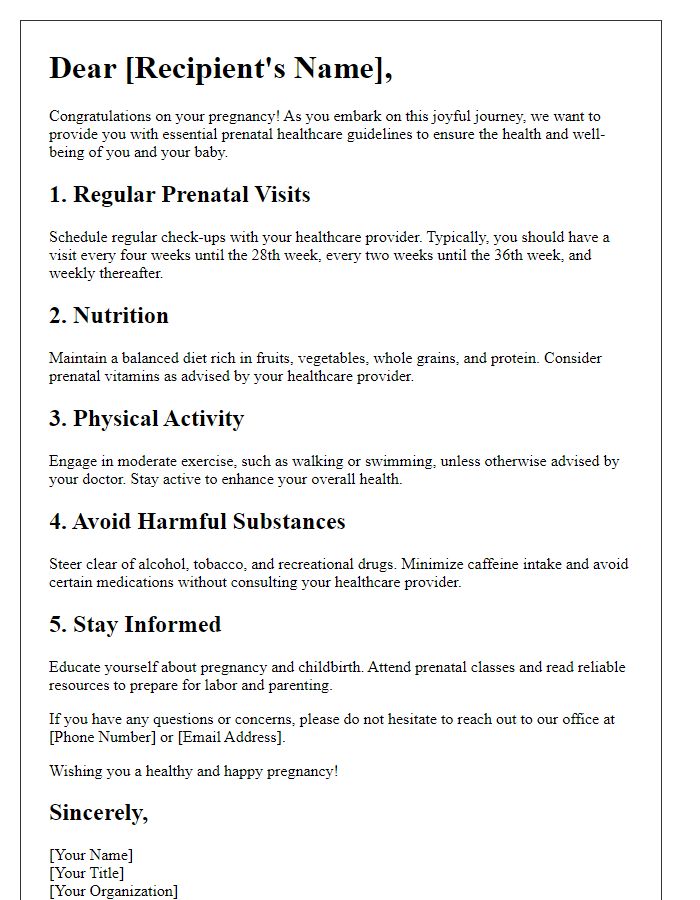
Letter template of prenatal mental health resources for expecting women.
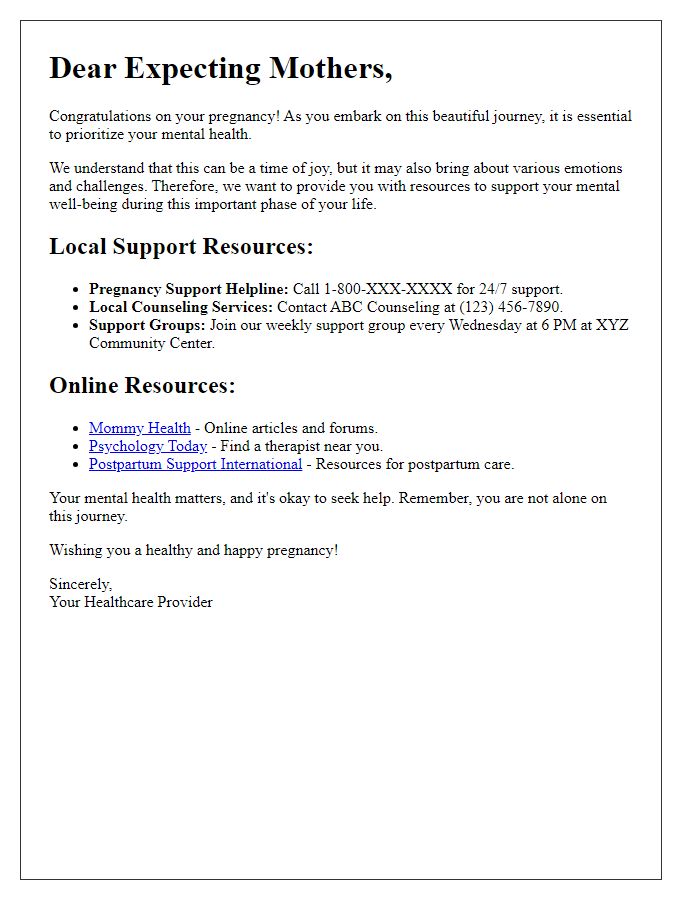
Letter template of prenatal partner involvement suggestions for comprehensive support.
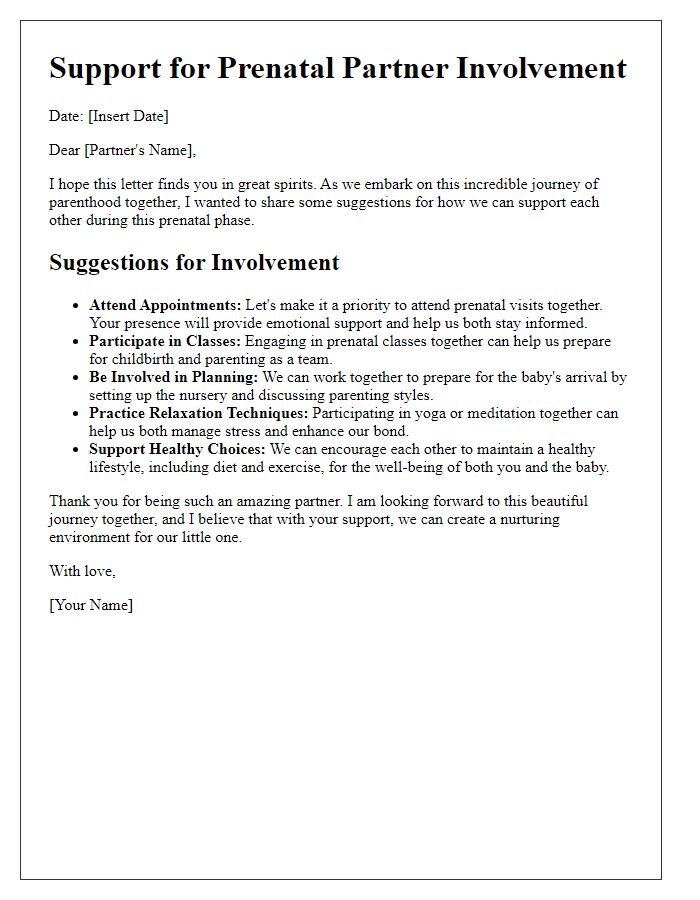

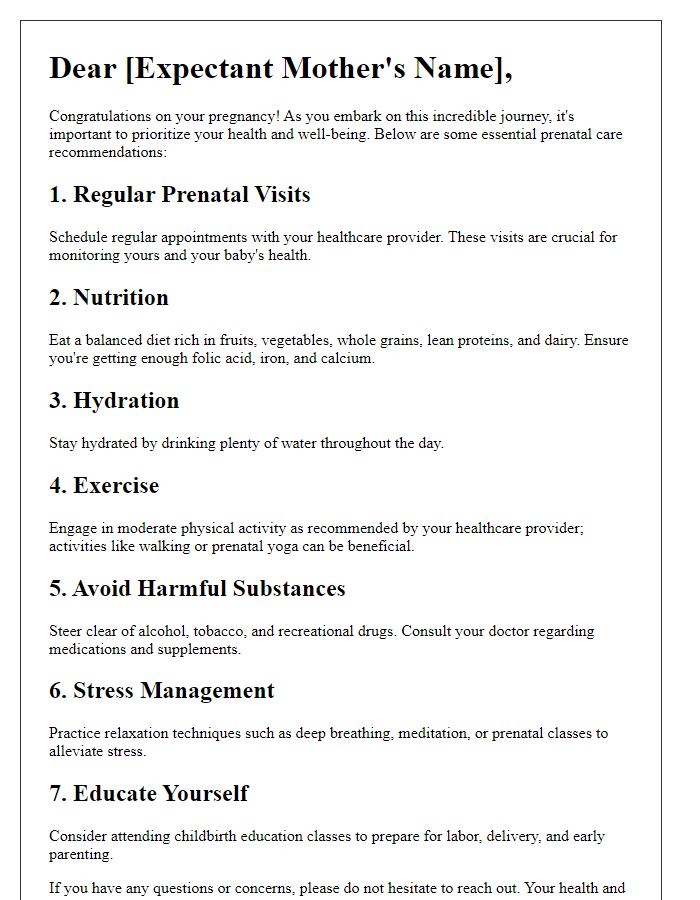

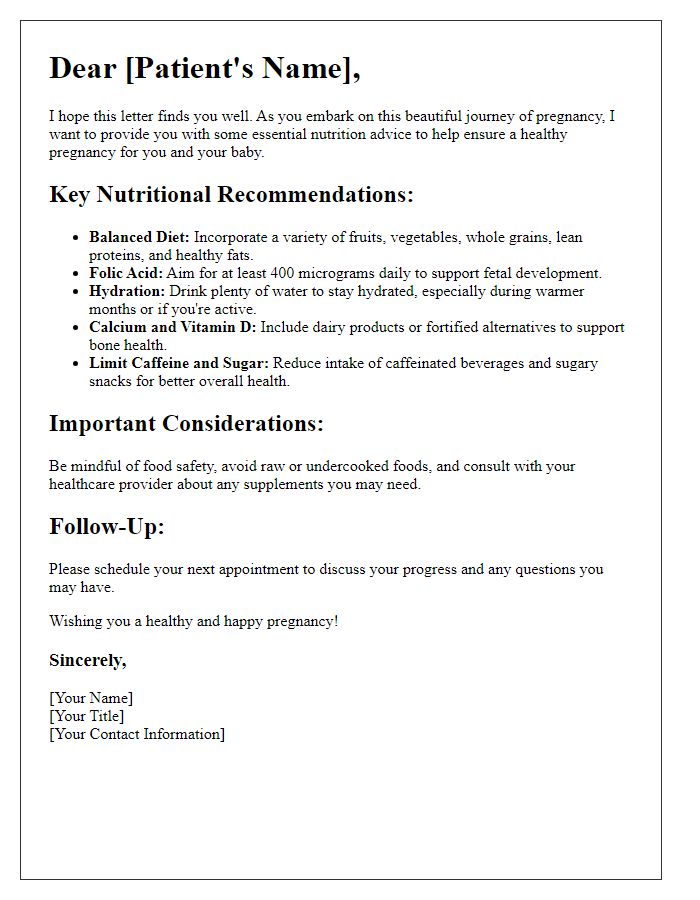
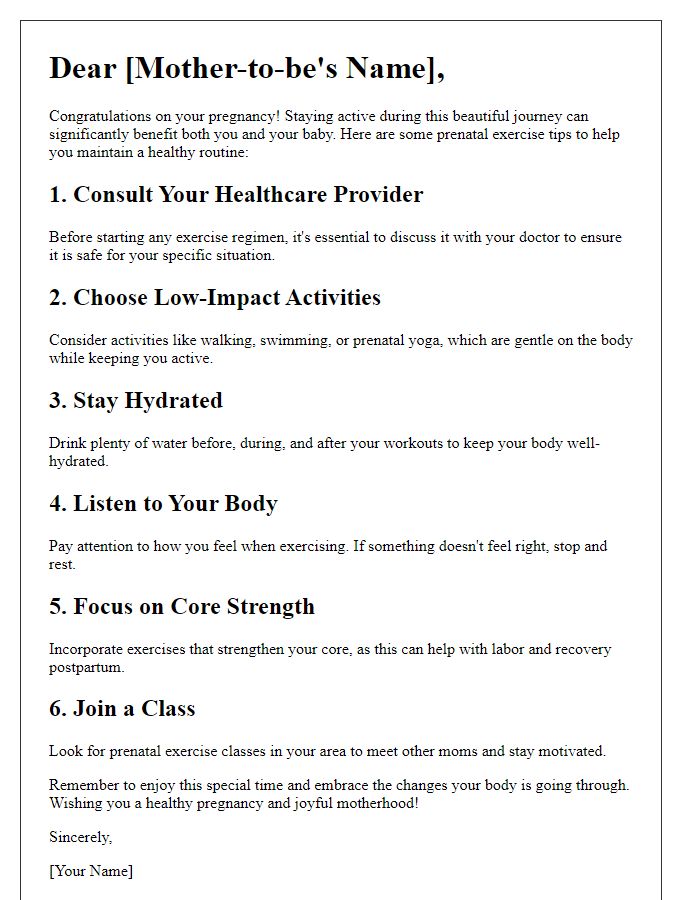
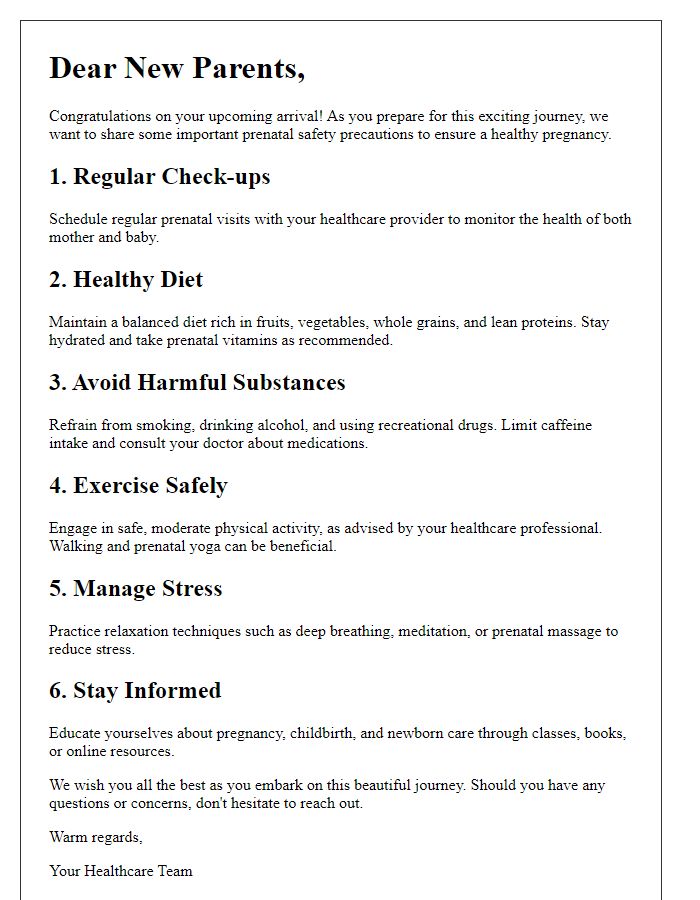
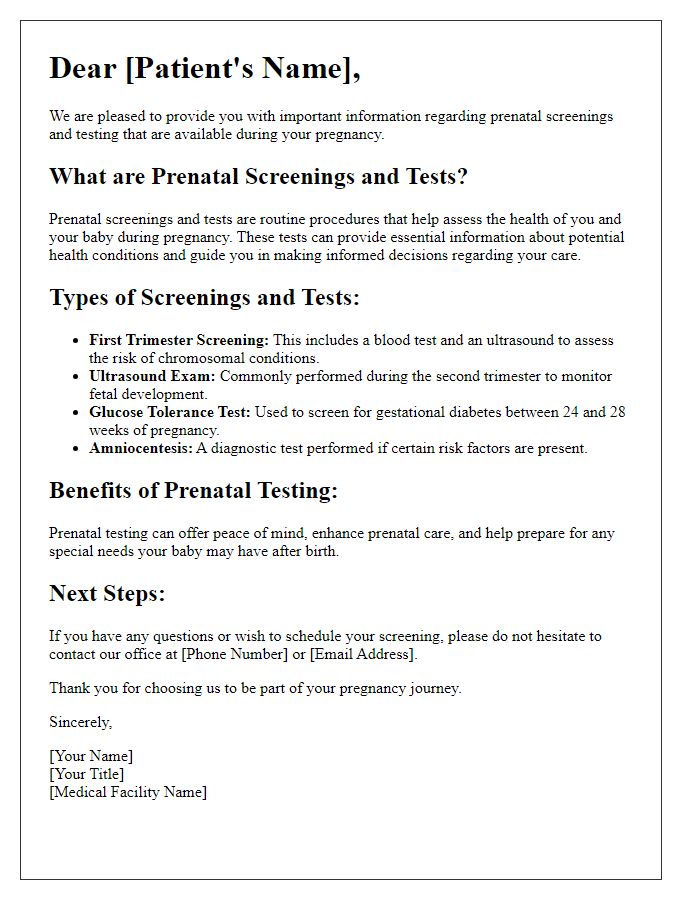



Comments